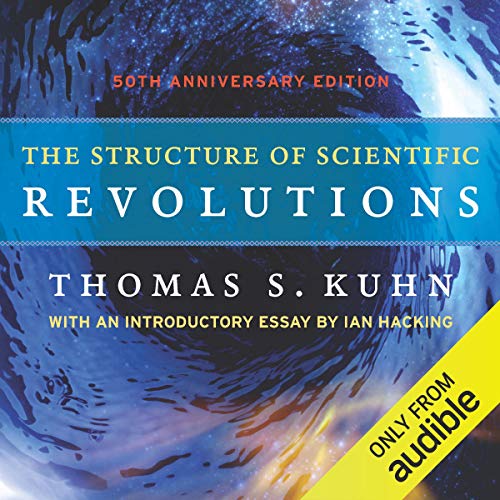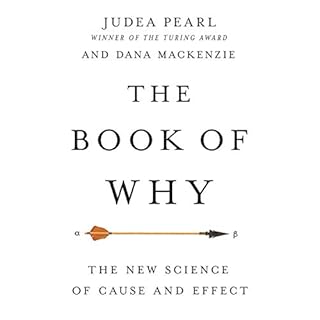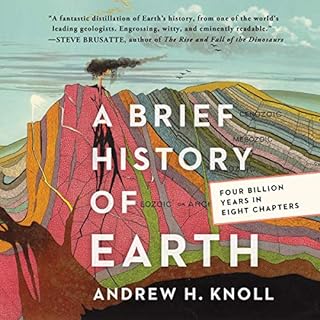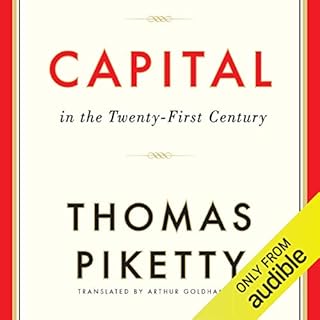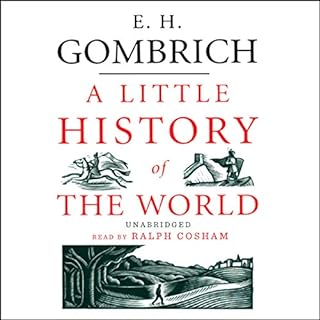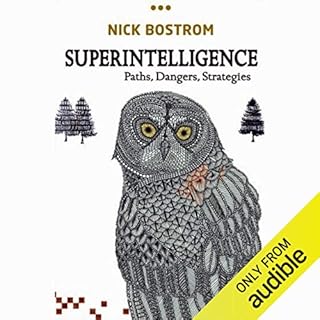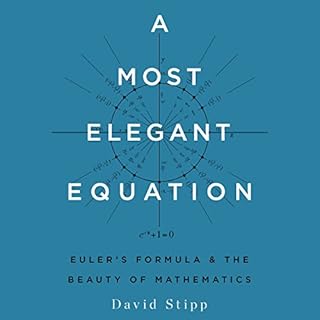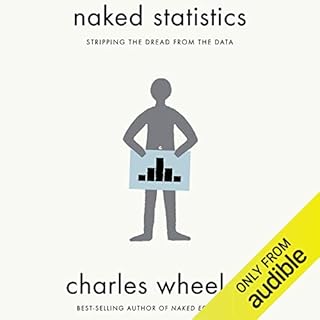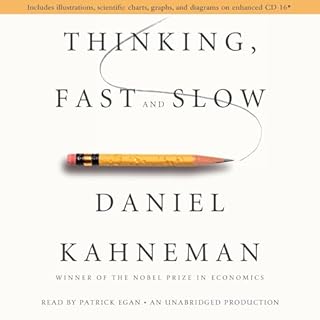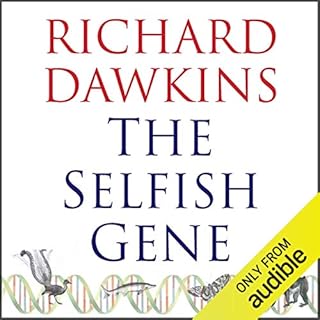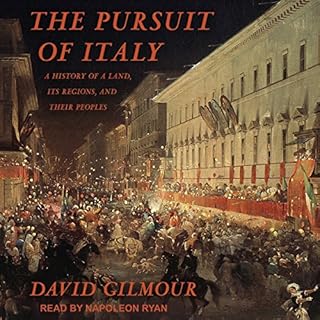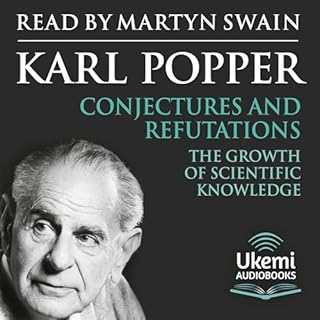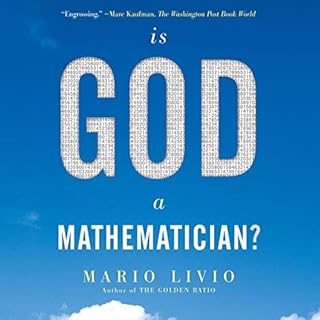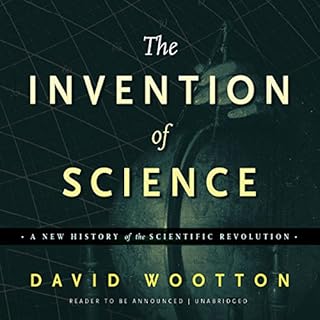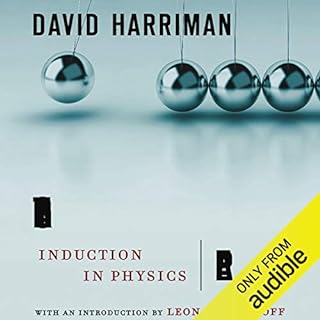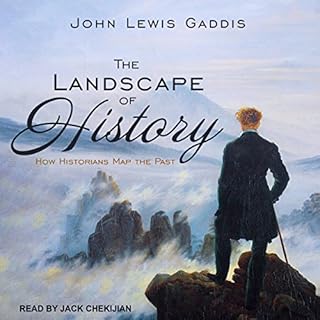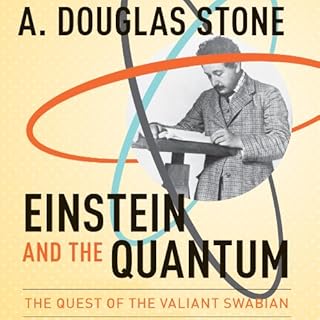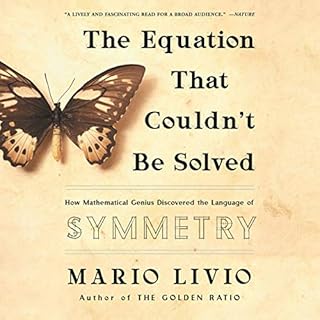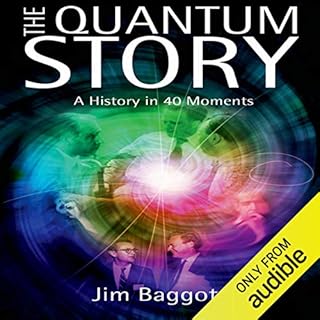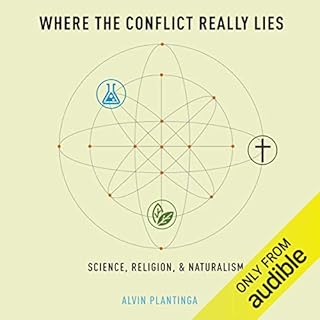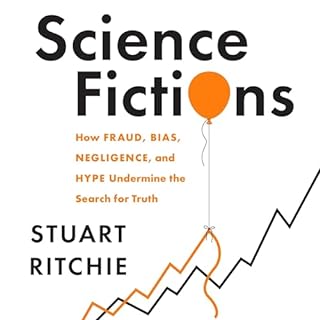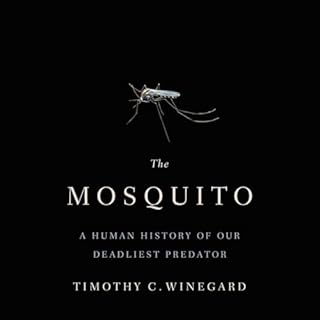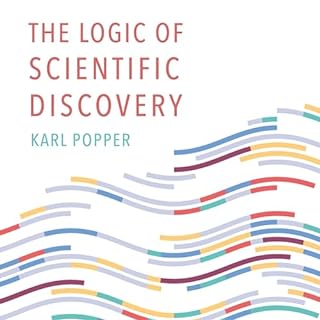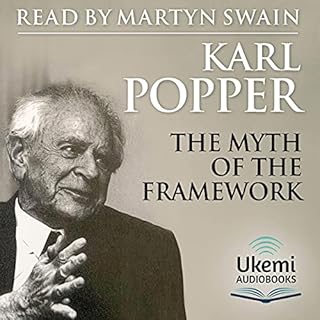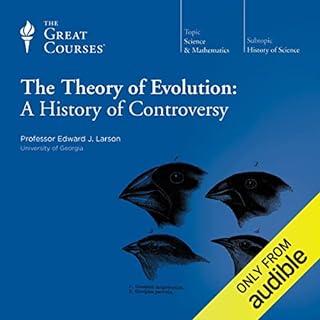-
The Structure of Scientific Revolutions
- Narrated by: Dennis Holland
- Length: 10 hrs and 14 mins
Failed to add items
Add to Cart failed.
Add to Wish List failed.
Remove from wishlist failed.
Adding to library failed
Follow podcast failed
Unfollow podcast failed
 Prime members: New to Audible?
Prime members: New to Audible?Get 2 free audiobooks during trial.
Buy for $24.95
No default payment method selected.
We are sorry. We are not allowed to sell this product with the selected payment method
Publisher's summary
A good book may have the power to change the way we see the world, but a great book actually becomes part of our daily consciousness, pervading our thinking to the point that we take it for granted, and we forget how provocative and challenging its ideas once were - and still are. The Structure of Scientific Revolutions is that kind of book. When it was first published in 1962, it was a landmark event in the history and philosophy of science. Fifty years later, it still has many lessons to teach.
With The Structure of Scientific Revolutions, Kuhn challenged long-standing linear notions of scientific progress, arguing that transformative ideas don't arise from the day-to-day, gradual process of experimentation and data accumulation but that the revolutions in science, those breakthrough moments that disrupt accepted thinking and offer unanticipated ideas, occur outside of "normal science", as he called it. Though Kuhn was writing when physics ruled the sciences, his ideas on how scientific revolutions bring order to the anomalies that amass over time in research experiments are still instructive in our biotech age.
Note: This new edition of Kuhn's essential work in the history of science includes an insightful introduction by Ian Hacking, which clarifies terms popularized by Kuhn, including paradigm and incommensurability, and applies Kuhn's ideas to the science of today.
Listeners also enjoyed...
-
The Book of Why
- The New Science of Cause and Effect
- By: Judea Pearl, Dana Mackenzie
- Narrated by: Mel Foster
- Length: 15 hrs and 14 mins
- Unabridged
-
Overall4.5 out of 5 stars 833
-
Performance4.5 out of 5 stars 690
-
Story4.5 out of 5 stars 688
"Correlation does not imply causation". This mantra has been invoked by scientists for decades and has led to a virtual prohibition on causal talk. But today, that taboo is dead. The causal revolution, sparked by Judea Pearl and his colleagues, has cut through a century of confusion and placed causality - the study of cause and effect - on a firm scientific basis.
-
5 out of 5 stars
-
Great book! Not a great audiobook.
- By rrwright on 05-30-18
By: Judea Pearl, and others
-
A Brief History of Earth
- Four Billion Years in Eight Chapters
- By: Andrew H. Knoll
- Narrated by: Tom Parks
- Length: 4 hrs and 57 mins
- Unabridged
-
Overall4.5 out of 5 stars 251
-
Performance4.5 out of 5 stars 207
-
Story4.5 out of 5 stars 207
Drawing on his decades of field research and up-to-the-minute understanding of the latest science, renowned geologist Andrew H. Knoll delivers a rigorous yet accessible biography of Earth, charting our home planet's epic 4.6 billion-year story. Placing 21st-century climate change in deep context, A Brief History of Earth is an indispensable look at where we’ve been and where we’re going.
-
5 out of 5 stars
-
Very chilling and well thought out
- By Colin Bump on 05-21-21
By: Andrew H. Knoll
-
Capital in the Twenty-First Century
- By: Thomas Piketty, Arthur Goldhammer - translator
- Narrated by: L. J. Ganser
- Length: 24 hrs and 58 mins
- Unabridged
-
Overall4.5 out of 5 stars 3,551
-
Performance4.5 out of 5 stars 2,977
-
Story4.5 out of 5 stars 2,955
What are the grand dynamics that drive the accumulation and distribution of capital? Questions about the long-term evolution of inequality, the concentration of wealth, and the prospects for economic growth lie at the heart of political economy. But satisfactory answers have been hard to find for lack of adequate data and clear guiding theories.
-
5 out of 5 stars
-
The Financial Times' Critique Doesn't Detract
- By Madeleine on 05-22-14
By: Thomas Piketty, and others
-
Against Method
- By: Paul Feyerabend
- Narrated by: Mike Fraser
- Length: 11 hrs and 43 mins
- Unabridged
-
Overall4.5 out of 5 stars 14
-
Performance4.5 out of 5 stars 10
-
Story4.5 out of 5 stars 10
Paul Feyerabend’s globally acclaimed work, which sparked and continues to stimulate fierce debate, examines the deficiencies of many widespread ideas about scientific progress and the nature of knowledge. Feyerabend argues that scientific advances can only be understood in a historical context. He looks at the way the philosophy of science has consistently overemphasized practice over method, and considers the possibility that anarchism could replace rationalism in the theory of knowledge.
-
5 out of 5 stars
-
A Must Read
- By Gus on 11-08-23
By: Paul Feyerabend
-
A Little History of the World
- By: E. H. Gombrich
- Narrated by: Ralph Cosham
- Length: 9 hrs and 11 mins
- Unabridged
-
Overall4.5 out of 5 stars 4,043
-
Performance4.5 out of 5 stars 3,392
-
Story4.5 out of 5 stars 3,378
E. H. Gombrich's world history, an international best seller now available in English for the first time, is a text dominated not by dates and facts but by the sweep of experience across the centuries, a guide to humanity's achievements, and an acute witness to its frailties.
-
5 out of 5 stars
-
an enlightening book; very well read
- By A.B.Oxford on 06-03-06
By: E. H. Gombrich
-
Superintelligence
- Paths, Dangers, Strategies
- By: Nick Bostrom
- Narrated by: Napoleon Ryan
- Length: 14 hrs and 17 mins
- Unabridged
-
Overall4 out of 5 stars 4,319
-
Performance4 out of 5 stars 3,728
-
Story4 out of 5 stars 3,689
Superintelligence asks the questions: What happens when machines surpass humans in general intelligence? Will artificial agents save or destroy us? Nick Bostrom lays the foundation for understanding the future of humanity and intelligent life. The human brain has some capabilities that the brains of other animals lack. It is to these distinctive capabilities that our species owes its dominant position. If machine brains surpassed human brains in general intelligence, then this new superintelligence could become extremely powerful - possibly beyond our control.
-
5 out of 5 stars
-
Colossus: The Forbin Project is coming
- By Gary on 09-12-14
By: Nick Bostrom
-
The Book of Why
- The New Science of Cause and Effect
- By: Judea Pearl, Dana Mackenzie
- Narrated by: Mel Foster
- Length: 15 hrs and 14 mins
- Unabridged
-
Overall4.5 out of 5 stars 833
-
Performance4.5 out of 5 stars 690
-
Story4.5 out of 5 stars 688
"Correlation does not imply causation". This mantra has been invoked by scientists for decades and has led to a virtual prohibition on causal talk. But today, that taboo is dead. The causal revolution, sparked by Judea Pearl and his colleagues, has cut through a century of confusion and placed causality - the study of cause and effect - on a firm scientific basis.
-
5 out of 5 stars
-
Great book! Not a great audiobook.
- By rrwright on 05-30-18
By: Judea Pearl, and others
-
A Brief History of Earth
- Four Billion Years in Eight Chapters
- By: Andrew H. Knoll
- Narrated by: Tom Parks
- Length: 4 hrs and 57 mins
- Unabridged
-
Overall4.5 out of 5 stars 251
-
Performance4.5 out of 5 stars 207
-
Story4.5 out of 5 stars 207
Drawing on his decades of field research and up-to-the-minute understanding of the latest science, renowned geologist Andrew H. Knoll delivers a rigorous yet accessible biography of Earth, charting our home planet's epic 4.6 billion-year story. Placing 21st-century climate change in deep context, A Brief History of Earth is an indispensable look at where we’ve been and where we’re going.
-
5 out of 5 stars
-
Very chilling and well thought out
- By Colin Bump on 05-21-21
By: Andrew H. Knoll
-
Capital in the Twenty-First Century
- By: Thomas Piketty, Arthur Goldhammer - translator
- Narrated by: L. J. Ganser
- Length: 24 hrs and 58 mins
- Unabridged
-
Overall4.5 out of 5 stars 3,551
-
Performance4.5 out of 5 stars 2,977
-
Story4.5 out of 5 stars 2,955
What are the grand dynamics that drive the accumulation and distribution of capital? Questions about the long-term evolution of inequality, the concentration of wealth, and the prospects for economic growth lie at the heart of political economy. But satisfactory answers have been hard to find for lack of adequate data and clear guiding theories.
-
5 out of 5 stars
-
The Financial Times' Critique Doesn't Detract
- By Madeleine on 05-22-14
By: Thomas Piketty, and others
-
Against Method
- By: Paul Feyerabend
- Narrated by: Mike Fraser
- Length: 11 hrs and 43 mins
- Unabridged
-
Overall4.5 out of 5 stars 14
-
Performance4.5 out of 5 stars 10
-
Story4.5 out of 5 stars 10
Paul Feyerabend’s globally acclaimed work, which sparked and continues to stimulate fierce debate, examines the deficiencies of many widespread ideas about scientific progress and the nature of knowledge. Feyerabend argues that scientific advances can only be understood in a historical context. He looks at the way the philosophy of science has consistently overemphasized practice over method, and considers the possibility that anarchism could replace rationalism in the theory of knowledge.
-
5 out of 5 stars
-
A Must Read
- By Gus on 11-08-23
By: Paul Feyerabend
-
A Little History of the World
- By: E. H. Gombrich
- Narrated by: Ralph Cosham
- Length: 9 hrs and 11 mins
- Unabridged
-
Overall4.5 out of 5 stars 4,043
-
Performance4.5 out of 5 stars 3,392
-
Story4.5 out of 5 stars 3,378
E. H. Gombrich's world history, an international best seller now available in English for the first time, is a text dominated not by dates and facts but by the sweep of experience across the centuries, a guide to humanity's achievements, and an acute witness to its frailties.
-
5 out of 5 stars
-
an enlightening book; very well read
- By A.B.Oxford on 06-03-06
By: E. H. Gombrich
-
Superintelligence
- Paths, Dangers, Strategies
- By: Nick Bostrom
- Narrated by: Napoleon Ryan
- Length: 14 hrs and 17 mins
- Unabridged
-
Overall4 out of 5 stars 4,319
-
Performance4 out of 5 stars 3,728
-
Story4 out of 5 stars 3,689
Superintelligence asks the questions: What happens when machines surpass humans in general intelligence? Will artificial agents save or destroy us? Nick Bostrom lays the foundation for understanding the future of humanity and intelligent life. The human brain has some capabilities that the brains of other animals lack. It is to these distinctive capabilities that our species owes its dominant position. If machine brains surpassed human brains in general intelligence, then this new superintelligence could become extremely powerful - possibly beyond our control.
-
5 out of 5 stars
-
Colossus: The Forbin Project is coming
- By Gary on 09-12-14
By: Nick Bostrom
-
A Most Elegant Equation
- Euler’s Formula and the Beauty of Mathematics
- By: David Stipp
- Narrated by: Sean Pratt
- Length: 5 hrs and 2 mins
- Unabridged
-
Overall4 out of 5 stars 305
-
Performance4.5 out of 5 stars 273
-
Story4 out of 5 stars 270
Bertrand Russell wrote that mathematics can exalt "as surely as poetry". This is especially true of one equation: ei(pi) + 1 = 0, the brainchild of Leonhard Euler, the Mozart of mathematics. More than two centuries after Euler's death, it is still regarded as a conceptual diamond of unsurpassed beauty. Called Euler's identity, or God's equation, it includes just five numbers but represents an astonishing revelation of hidden connections.
-
3 out of 5 stars
-
Good treatment of the subject
- By Kindle Customer on 04-09-18
By: David Stipp
-
Naked Statistics
- Stripping the Dread from the Data
- By: Charles Wheelan
- Narrated by: Jonathan Davis
- Length: 10 hrs and 48 mins
- Unabridged
-
Overall4.5 out of 5 stars 3,456
-
Performance4.5 out of 5 stars 2,923
-
Story4.5 out of 5 stars 2,908
From batting averages and political polls to game shows and medical research, the real-world application of statistics continues to grow by leaps and bounds. How can we catch schools that cheat on standardized tests? How does Netflix know which movies you'll like? What is causing the rising incidence of autism? As best-selling author Charles Wheelan shows us in Naked Statistics, the right data and a few well-chosen statistical tools can help us answer these questions and more.
-
3 out of 5 stars
-
Starts well then becomes non-Audible
- By Michael on 09-07-13
By: Charles Wheelan
-
Thinking, Fast and Slow
- By: Daniel Kahneman
- Narrated by: Patrick Egan
- Length: 20 hrs and 2 mins
- Unabridged
-
Overall4.5 out of 5 stars 19,552
-
Performance4.5 out of 5 stars 16,231
-
Story4.5 out of 5 stars 16,075
The guru to the gurus at last shares his knowledge with the rest of us. Nobel laureate Daniel Kahneman's seminal studies in behavioral psychology, behavioral economics, and happiness studies have influenced numerous other authors, including Steven Pinker and Malcolm Gladwell. In Thinking, Fast and Slow, Kahneman at last offers his own, first book for the general public. It is a lucid and enlightening summary of his life's work. It will change the way you think about thinking. Two systems drive the way we think and make choices, Kahneman explains....
-
3 out of 5 stars
-
Difficult Listen, but Probably a Great Read
- By Mike Kircher on 01-12-12
By: Daniel Kahneman
-
The Club
- Johnson, Boswell, and the Friends Who Shaped an Age
- By: Leo Damrosch
- Narrated by: Simon Vance
- Length: 15 hrs and 1 min
- Unabridged
-
Overall4.5 out of 5 stars 372
-
Performance4.5 out of 5 stars 308
-
Story4.5 out of 5 stars 303
In 1763, the painter Joshua Reynolds proposed to his friend Samuel Johnson that they invite a few friends to join them every Friday at the Turk's Head Tavern in London to dine, drink, and talk until midnight. Eventually, the group came to include among its members Edmund Burke, Adam Smith, Edward Gibbon, and James Boswell. It was known simply as "the Club". In this captivating audiobook, Leo Damrosch brings alive a brilliant, competitive, and eccentric cast of characters.
-
5 out of 5 stars
-
Wonderful survey
- By Tad Davis on 05-10-19
By: Leo Damrosch
-
The Selfish Gene
- By: Richard Dawkins
- Narrated by: Richard Dawkins, Lalla Ward
- Length: 16 hrs and 12 mins
- Unabridged
-
Overall4.5 out of 5 stars 8,924
-
Performance4.5 out of 5 stars 7,541
-
Story4.5 out of 5 stars 7,463
Richard Dawkins' brilliant reformulation of the theory of natural selection has the rare distinction of having provoked as much excitement and interest outside the scientific community as within it. His theories have helped change the whole nature of the study of social biology, and have forced thousands to rethink their beliefs about life.
-
5 out of 5 stars
-
Better than print!
- By J. D. May on 07-31-12
By: Richard Dawkins
-
The Pursuit of Italy
- A History of a Land, Its Regions, and Their Peoples
- By: David Gilmour
- Narrated by: Napoleon Ryan
- Length: 19 hrs and 25 mins
- Unabridged
-
Overall4.5 out of 5 stars 123
-
Performance4 out of 5 stars 109
-
Story4.5 out of 5 stars 108
Did Garibaldi do Italy a disservice when he helped its disparate parts achieve unity? Was the goal of political unification a mistake? These questions are asked and answered in a number of ways in this engaging, original consideration of the many histories that contribute to the brilliance - and weakness - of Italy today. David Gilmour's exploration of Italian life over the centuries is filled with provocative anecdotes as well as personal observations.
-
3 out of 5 stars
-
Good history: Tough Narration
- By C.S. on 11-12-18
By: David Gilmour
-
Conjectures and Refutations
- The Growth of Scientific Knowledge
- By: Karl Popper
- Narrated by: Martyn Swain
- Length: 22 hrs and 14 mins
- Unabridged
-
Overall5 out of 5 stars 17
-
Performance5 out of 5 stars 12
-
Story5 out of 5 stars 12
Conjectures and Refutations is one of Karl Popper’s most wide-ranging and popular works, notable not only for its acute insights into the way scientific knowledge grows, but also for applying those insights to politics and to history. It provides one of the clearest and most accessible statements of the fundamental idea that guided his work: not only our knowledge but our aims and our standards grow through an unending process of trial and error.
-
5 out of 5 stars
-
Essential for Age of AI
- By Chris Mays on 08-08-23
By: Karl Popper
-
Is God a Mathematician?
- By: Mario Livio
- Narrated by: Tom Parks
- Length: 9 hrs and 4 mins
- Unabridged
-
Overall4.5 out of 5 stars 71
-
Performance4.5 out of 5 stars 62
-
Story4.5 out of 5 stars 62
Nobel Laureate Eugene Wigner once wondered about "the unreasonable effectiveness of mathematics" in the formulation of the laws of nature. Is God a Mathematician? investigates why mathematics is as powerful as it is. From ancient times to the present, scientists and philosophers have marveled at how such a seemingly abstract discipline could so perfectly explain the natural world. More than that - mathematics has often made predictions, for example, about subatomic particles or cosmic phenomena that were unknown at the time, but later were proven to be true.
-
5 out of 5 stars
-
Origins of Mathematics
- By Rick B on 07-08-21
By: Mario Livio
-
The Blind Watchmaker
- Why the Evidence of Evolution Reveals a Universe Without Design
- By: Richard Dawkins
- Narrated by: Richard Dawkins, Lalla Ward
- Length: 14 hrs and 40 mins
- Unabridged
-
Overall4.5 out of 5 stars 2,814
-
Performance4.5 out of 5 stars 2,435
-
Story4.5 out of 5 stars 2,406
The Blind Watchmaker, knowledgably narrated by author Richard Dawkins, is as prescient and timely a book as ever. The watchmaker belongs to the 18th-century theologian William Paley, who argued that just as a watch is too complicated and functional to have sprung into existence by accident, so too must all living things, with their far greater complexity, be purposefully designed. Charles Darwin's brilliant discovery challenged the creationist arguments; but only Richard Dawkins could have written this elegant riposte.
-
4 out of 5 stars
-
Challenging textbook more than an enjoyable listen
- By Eric on 01-15-12
By: Richard Dawkins
-
Magicians of the Gods
- The Forgotten Wisdom of Earth’s Lost Civilization
- By: Graham Hancock
- Narrated by: Graham Hancock
- Length: 14 hrs and 54 mins
- Unabridged
-
Overall4.5 out of 5 stars 6,639
-
Performance5 out of 5 stars 5,904
-
Story4.5 out of 5 stars 5,892
Graham Hancock's multi-million bestseller Fingerprints of the Gods remains an astonishing, deeply controversial, wide-ranging investigation of the mysteries of our past and the evidence for Earth's lost civilization. Twenty years on, Hancock returns with the sequel to his seminal work filled with completely new scientific and archaeological evidence, which has only recently come to light.
-
5 out of 5 stars
-
"Brilliant" is an understatement.
- By Brian on 11-13-15
By: Graham Hancock
-
Answer to Job
- By: C. G. Jung, R. F. C. Hull - translator
- Narrated by: John Telfer
- Length: 5 hrs and 9 mins
- Unabridged
-
Overall4.5 out of 5 stars 74
-
Performance5 out of 5 stars 66
-
Story4.5 out of 5 stars 64
For a world that over the past century has witnessed horrors the like of which could not have been imagined by earlier generations, Job’s cries of despair and incomprehension are all too recognisable. The visionary psychotherapist Carl Gustav Jung understood this and responded with this remarkable book, in which he set himself face to face with 'the unvarnished spectacle of divine savagery and ruthlessness'.
-
4 out of 5 stars
-
man is not looking for God..God is looking for man
- By Nevets on 04-16-23
By: C. G. Jung, and others
-
Philosophy of Science (2nd Edition)
- A Very Short Introduction
- By: Samir Okasha
- Narrated by: Liam Gerrard
- Length: 4 hrs and 28 mins
- Unabridged
-
Overall5 out of 5 stars 24
-
Performance5 out of 5 stars 22
-
Story5 out of 5 stars 22
How much faith should we place in what scientists tell us? Is it possible for scientific knowledge to be fully "objective"? What, really, can be defined as science? In the second edition of this very short introduction, Samir Okasha explores the main themes and theories of contemporary philosophy of science and investigates fascinating, challenging questions such as these.
-
3 out of 5 stars
-
VSI#67
- By Darwin8u on 10-29-24
By: Samir Okasha
Critic reviews
Featured Article: The Best Science Listens to Channel Your Inner Einstein
While you might listen in order to be entertained, there are also a host of works intended to be purely educational. We chose the best science titles on this list for the fact that they are both. These selections not only bring important perspectives on some of the most pressing scientific issues of our time—they’re also written and performed with a refreshing clarity that makes them easy to swallow and entertaining to the end.
Related to this topic
-
Is God a Mathematician?
- By: Mario Livio
- Narrated by: Tom Parks
- Length: 9 hrs and 4 mins
- Unabridged
-
Overall4.5 out of 5 stars 71
-
Performance4.5 out of 5 stars 62
-
Story4.5 out of 5 stars 62
Nobel Laureate Eugene Wigner once wondered about "the unreasonable effectiveness of mathematics" in the formulation of the laws of nature. Is God a Mathematician? investigates why mathematics is as powerful as it is. From ancient times to the present, scientists and philosophers have marveled at how such a seemingly abstract discipline could so perfectly explain the natural world. More than that - mathematics has often made predictions, for example, about subatomic particles or cosmic phenomena that were unknown at the time, but later were proven to be true.
-
5 out of 5 stars
-
Origins of Mathematics
- By Rick B on 07-08-21
By: Mario Livio
-
The Invention of Science
- A New History of the Scientific Revolution
- By: David Wootton
- Narrated by: James Langton
- Length: 22 hrs and 5 mins
- Unabridged
-
Overall4 out of 5 stars 134
-
Performance4.5 out of 5 stars 120
-
Story4.5 out of 5 stars 121
In this fascinating history spanning continents and centuries, historian David Wootton offers a lively defense of science, revealing why the Scientific Revolution was truly the greatest event in our history. The Invention of Science goes back 500 years in time to chronicle this crucial transformation, exploring the factors that led to its birth and the people who made it happen. Wootton argues that the Scientific Revolution was actually five separate yet concurrent events that developed independently.
-
2 out of 5 stars
-
A Good Read Spoiled
- By David A. Donnelly on 12-23-16
By: David Wootton
-
The Logical Leap
- Induction in Physics
- By: David Harriman
- Narrated by: Erik Singer
- Length: 10 hrs and 8 mins
- Unabridged
-
Overall4 out of 5 stars 163
-
Performance4.5 out of 5 stars 81
-
Story4.5 out of 5 stars 81
Beginning with a detailed discussion of the role of mathematics and experimentation in validating generalizations in physics-looking closely at the reasoning of scientists such as Galileo, Kepler, Newton, Lavoisier, and Maxwell-Harriman skillfully argues that the inductive method used in philosophy is in principle indistinguishable from the method used in physics.
-
5 out of 5 stars
-
Quite refreshing
- By Eric on 10-12-10
By: David Harriman
-
The Landscape of History
- How Historians Map the Past
- By: John Lewis Gaddis
- Narrated by: Jack Chekijian
- Length: 6 hrs and 16 mins
- Unabridged
-
Overall4 out of 5 stars 103
-
Performance4 out of 5 stars 92
-
Story4.5 out of 5 stars 88
What is history, and why should we study it? Is there such a thing as historical truth? Is history a science? One of the most accomplished historians at work today, John Lewis Gaddis, answers these and other questions in this short, witty, and humane book. The Landscape of History provides a searching look at the historian's craft as well as a strong argument for why a historical consciousness should matter to us today.
-
5 out of 5 stars
-
Excellent Book!
- By Billy on 09-15-18
-
The Scientist in the Early Roman Empire
- By: Richard Carrier
- Narrated by: Richard Carrier
- Length: 18 hrs and 29 mins
- Unabridged
-
Overall4.5 out of 5 stars 49
-
Performance4.5 out of 5 stars 45
-
Story4.5 out of 5 stars 43
In this extensive sequel to Science Education in the Early Roman Empire, Dr. Richard Carrier explores the social history of scientists in the Roman era. Was science in decline or experiencing a revival under the Romans? What was an ancient scientist thought to be and do? Who were they, and who funded their research? And how did pagans differ from their Christian peers in their views toward science and scientists?
-
5 out of 5 stars
-
This Book is a Bombshell
- By James on 06-15-18
By: Richard Carrier
-
The Devil's Delusion
- Atheism and its Scientific Pretensions
- By: David Berlinski
- Narrated by: Dennis Holland
- Length: 6 hrs and 7 mins
- Unabridged
-
Overall4.5 out of 5 stars 654
-
Performance4.5 out of 5 stars 561
-
Story4.5 out of 5 stars 562
Militant atheism is on the rise. In recent years, Richard Dawkins, Sam Harris, Daniel Dennett, and Christopher Hitchens have produced a steady stream of best-selling books denigrating religious belief. These authors are merely the leading edge of a larger movement that includes much of the scientific community. In response, mathematician David Berlinski, himself a secular Jew, delivers a biting defense of religious thought.
-
2 out of 5 stars
-
Riddled With Problems
- By Ben on 11-01-13
By: David Berlinski
-
Is God a Mathematician?
- By: Mario Livio
- Narrated by: Tom Parks
- Length: 9 hrs and 4 mins
- Unabridged
-
Overall4.5 out of 5 stars 71
-
Performance4.5 out of 5 stars 62
-
Story4.5 out of 5 stars 62
Nobel Laureate Eugene Wigner once wondered about "the unreasonable effectiveness of mathematics" in the formulation of the laws of nature. Is God a Mathematician? investigates why mathematics is as powerful as it is. From ancient times to the present, scientists and philosophers have marveled at how such a seemingly abstract discipline could so perfectly explain the natural world. More than that - mathematics has often made predictions, for example, about subatomic particles or cosmic phenomena that were unknown at the time, but later were proven to be true.
-
5 out of 5 stars
-
Origins of Mathematics
- By Rick B on 07-08-21
By: Mario Livio
-
The Invention of Science
- A New History of the Scientific Revolution
- By: David Wootton
- Narrated by: James Langton
- Length: 22 hrs and 5 mins
- Unabridged
-
Overall4 out of 5 stars 134
-
Performance4.5 out of 5 stars 120
-
Story4.5 out of 5 stars 121
In this fascinating history spanning continents and centuries, historian David Wootton offers a lively defense of science, revealing why the Scientific Revolution was truly the greatest event in our history. The Invention of Science goes back 500 years in time to chronicle this crucial transformation, exploring the factors that led to its birth and the people who made it happen. Wootton argues that the Scientific Revolution was actually five separate yet concurrent events that developed independently.
-
2 out of 5 stars
-
A Good Read Spoiled
- By David A. Donnelly on 12-23-16
By: David Wootton
-
The Logical Leap
- Induction in Physics
- By: David Harriman
- Narrated by: Erik Singer
- Length: 10 hrs and 8 mins
- Unabridged
-
Overall4 out of 5 stars 163
-
Performance4.5 out of 5 stars 81
-
Story4.5 out of 5 stars 81
Beginning with a detailed discussion of the role of mathematics and experimentation in validating generalizations in physics-looking closely at the reasoning of scientists such as Galileo, Kepler, Newton, Lavoisier, and Maxwell-Harriman skillfully argues that the inductive method used in philosophy is in principle indistinguishable from the method used in physics.
-
5 out of 5 stars
-
Quite refreshing
- By Eric on 10-12-10
By: David Harriman
-
The Landscape of History
- How Historians Map the Past
- By: John Lewis Gaddis
- Narrated by: Jack Chekijian
- Length: 6 hrs and 16 mins
- Unabridged
-
Overall4 out of 5 stars 103
-
Performance4 out of 5 stars 92
-
Story4.5 out of 5 stars 88
What is history, and why should we study it? Is there such a thing as historical truth? Is history a science? One of the most accomplished historians at work today, John Lewis Gaddis, answers these and other questions in this short, witty, and humane book. The Landscape of History provides a searching look at the historian's craft as well as a strong argument for why a historical consciousness should matter to us today.
-
5 out of 5 stars
-
Excellent Book!
- By Billy on 09-15-18
-
The Scientist in the Early Roman Empire
- By: Richard Carrier
- Narrated by: Richard Carrier
- Length: 18 hrs and 29 mins
- Unabridged
-
Overall4.5 out of 5 stars 49
-
Performance4.5 out of 5 stars 45
-
Story4.5 out of 5 stars 43
In this extensive sequel to Science Education in the Early Roman Empire, Dr. Richard Carrier explores the social history of scientists in the Roman era. Was science in decline or experiencing a revival under the Romans? What was an ancient scientist thought to be and do? Who were they, and who funded their research? And how did pagans differ from their Christian peers in their views toward science and scientists?
-
5 out of 5 stars
-
This Book is a Bombshell
- By James on 06-15-18
By: Richard Carrier
-
The Devil's Delusion
- Atheism and its Scientific Pretensions
- By: David Berlinski
- Narrated by: Dennis Holland
- Length: 6 hrs and 7 mins
- Unabridged
-
Overall4.5 out of 5 stars 654
-
Performance4.5 out of 5 stars 561
-
Story4.5 out of 5 stars 562
Militant atheism is on the rise. In recent years, Richard Dawkins, Sam Harris, Daniel Dennett, and Christopher Hitchens have produced a steady stream of best-selling books denigrating religious belief. These authors are merely the leading edge of a larger movement that includes much of the scientific community. In response, mathematician David Berlinski, himself a secular Jew, delivers a biting defense of religious thought.
-
2 out of 5 stars
-
Riddled With Problems
- By Ben on 11-01-13
By: David Berlinski
-
Uncertainty
- Einstein, Heisenberg, Bohr, and the Struggle for the Soul of Science
- By: David Lindley
- Narrated by: Robert Blumenfeld
- Length: 7 hrs and 2 mins
- Unabridged
-
Overall4 out of 5 stars 370
-
Performance4 out of 5 stars 208
-
Story4.5 out of 5 stars 209
Werner Heisenberg's "uncertainty principle" challenged centuries of scientific understanding, placed him in direct opposition to Albert Einstein, and put Niels Bohr in the middle of one of the most heated debates in scientific history. Heisenberg's theorem stated that there were physical limits to what we could know about sub-atomic particles; this "uncertainty" would have shocking implications.
-
4 out of 5 stars
-
fascinating insight into the real drama of physics
- By Ryan on 09-07-10
By: David Lindley
-
Einstein and the Quantum
- The Quest of the Valiant Swabian
- By: A. Douglas Stone
- Narrated by: Gabriel Vaughan
- Length: 11 hrs and 9 mins
- Unabridged
-
Overall4.5 out of 5 stars 71
-
Performance4.5 out of 5 stars 61
-
Story4.5 out of 5 stars 61
Einstein and the Quantum reveals for the first time the full significance of Albert Einstein's contributions to quantum theory. Einstein famously rejected quantum mechanics, observing that God does not play dice. But, in fact, he thought more about the nature of atoms, molecules, and the emission and absorption of light - the core of what we now know as quantum theory - than he did about relativity.
-
5 out of 5 stars
-
educational and fun
- By Amjad on 12-04-13
By: A. Douglas Stone
-
The Equation That Couldn't Be Solved
- How Mathematical Genius Discovered the Language of Symmetry
- By: Mario Livio
- Narrated by: Tom Parks
- Length: 11 hrs and 45 mins
- Unabridged
-
Overall4.5 out of 5 stars 67
-
Performance4.5 out of 5 stars 58
-
Story4.5 out of 5 stars 58
For thousands of years mathematicians solved progressively more difficult algebraic equations, until they encountered the quintic equation, which resisted solution for three centuries. Working independently, two prodigies ultimately proved that the quintic cannot be solved by a simple formula. The first popular account of the mathematics of symmetry and order, The Equation That Couldn't Be Solved is told not through abstract formulas but in a beautifully written and dramatic account of the lives and work of some of the greatest and most intriguing mathematicians in history.
-
5 out of 5 stars
-
Historical Perspective Appreciated
- By Michael Hanrahan on 01-22-20
By: Mario Livio
-
A Brief History of Infinity: The Quest to Think the Unthinkable
- Brief Histories
- By: Brian Clegg
- Narrated by: Gordon Griffin
- Length: 9 hrs and 3 mins
- Unabridged
-
Overall4.5 out of 5 stars 41
-
Performance4.5 out of 5 stars 35
-
Story4.5 out of 5 stars 35
Space is big. Really big. You just won't believe how vastly, hugely, mind-bogglingly big it is. I mean, you may think it's a long way down the street to the chemist, but that's just peanuts to space.' Douglas Adams, Hitch-hiker's Guide to the Galaxy.We human beings have trouble with infinity - yet infinity is a surprisingly human subject. Philosophers and mathematicians have gone mad contemplating its nature and complexity - yet it is a concept routinely used by schoolchildren. Exploring the infinite is a
-
3 out of 5 stars
-
Really not great in Audio, not great otherwise
- By Michael on 03-29-13
By: Brian Clegg
-
The Story of Western Science
- From the Writings of Aristotle to the Big Bang Theory
- By: Susan Wise Bauer
- Narrated by: Julian Elfer
- Length: 8 hrs and 3 mins
- Unabridged
-
Overall4.5 out of 5 stars 291
-
Performance4.5 out of 5 stars 248
-
Story4.5 out of 5 stars 253
Far too often, public discussion of science is carried out by journalists, voters, and politicians who have received their science secondhand. The Story of Western Science shows us the joy and importance of reading groundbreaking science writing for ourselves and guides us back to the masterpieces that have changed the way we think about our world, our cosmos, and ourselves.
-
4 out of 5 stars
-
Good text, tedious book structure
- By Diane K. on 10-07-15
By: Susan Wise Bauer
-
A Theory of Everything (That Matters)
- A Brief Guide to Einstein, Relativity, and His Surprising Thoughts on God
- By: Alister McGrath
- Narrated by: Frazer Douglas
- Length: 5 hrs and 5 mins
- Unabridged
-
Overall4.5 out of 5 stars 32
-
Performance5 out of 5 stars 26
-
Story4.5 out of 5 stars 26
Einstein’s revolutionary scientific ideas have transformed our world, ushering in the nuclear age. The current pace of scientific and technological progress is simply astounding. So is there any place for faith in such a world? Einstein himself gave careful thought to the deepest questions of life. His towering intellectual status means he is someone worth listening to when we think through the big questions of life.
-
4 out of 5 stars
-
Makes you think...
- By Katy Bagdon on 10-10-19
By: Alister McGrath
-
The Quantum Story
- A History in 40 Moments
- By: Jim Baggott
- Narrated by: Mike Pollock
- Length: 15 hrs and 27 mins
- Unabridged
-
Overall4 out of 5 stars 235
-
Performance4 out of 5 stars 174
-
Story4 out of 5 stars 174
Utterly beautiful. Profoundly disconcerting. Quantum theory is quite simply the most successful account of the physical universe ever devised. Its concepts underpin much of the 21st-century technology that we now take for granted. But at the same time it has completely undermined our ability to make sense of the world at its most fundamental level.
-
1 out of 5 stars
-
who's the target reader?
- By Hannah on 09-17-11
By: Jim Baggott
-
The Function of Reason
- By: Alfred North Whitehead
- Narrated by: Ray Childs
- Length: 2 hrs and 34 mins
- Unabridged
-
Overall4.5 out of 5 stars 64
-
Performance4.5 out of 5 stars 52
-
Story4.5 out of 5 stars 48
Whitehead presented these three lectures at Princeton University in 1929. Although 85 years have passed, his central thesis and his analysis remain remarkably current. The scientific materialism that Whitehead opposed with such vigor continues to dominate in academic circles, and even now those who question that worldview are often accused of being antiscientific. This is especially true in discussions of the nature of the human mind and its relation to the body (particularly the brain).
-
5 out of 5 stars
-
Good
- By Benjamin on 06-17-22
-
To Explain the World
- The Discovery of Modern Science
- By: Steven Weinberg
- Narrated by: Tom Perkins
- Length: 10 hrs and 43 mins
- Unabridged
-
Overall4 out of 5 stars 261
-
Performance4.5 out of 5 stars 220
-
Story4 out of 5 stars 218
In this rich, irreverent, and compelling history, Nobel Prize-winning physicist Steven Weinberg takes us across centuries, from ancient Miletus to medieval Baghdad and Oxford, from Plato's Academy and the Museum of Alexandria to the cathedral school of Chartres and the Royal Society of London. He shows that the scientists of ancient and medieval times not only did not understand what we understand about the world--they did not understand what there is to understand or how to understand it.
-
4 out of 5 stars
-
How the world created a Newton
- By Gary on 03-02-15
By: Steven Weinberg
-
Where the Conflict Really Lies
- Science, Religion, & Naturalism
- By: Alvin Plantinga
- Narrated by: Michael Butler Murray
- Length: 12 hrs and 43 mins
- Unabridged
-
Overall4.5 out of 5 stars 252
-
Performance4.5 out of 5 stars 220
-
Story4.5 out of 5 stars 220
This audiobook is a long-awaited major statement by a pre-eminent analytic philosopher, Alvin Plantinga, on one of our biggest debates - the compatibility of science and religion. The last twenty years has seen a cottage industry of books on this divide, but with little consensus emerging. Plantinga, as a top philosopher but also a proponent of the rationality of religious belief, has a unique contribution to make. His theme in this short book is that the conflict between science and theistic religion is actually superficial, and that at a deeper level they are in concord.
-
2 out of 5 stars
-
The reader makes or breaks an audiobook.
- By Alec on 02-16-15
By: Alvin Plantinga
-
When Einstein Walked with Gödel
- Excursions to the Edge of Thought
- By: Jim Holt
- Narrated by: David Stifel
- Length: 15 hrs and 19 mins
- Unabridged
-
Overall4.5 out of 5 stars 633
-
Performance4.5 out of 5 stars 536
-
Story4.5 out of 5 stars 538
Does time exist? What is infinity? Why do mirrors reverse left and right but not up and down? In this scintillating collection, Holt explores the human mind, the cosmos, and the thinkers who’ve tried to encompass the latter with the former. With his trademark clarity and humor, Holt probes the mysteries of quantum mechanics, the quest for the foundations of mathematics, and the nature of logic and truth. Along the way, he offers intimate biographical sketches of celebrated and neglected thinkers, from the physicist Emmy Noether to the computing pioneer Alan Turing and the discoverer of fractals, Benoit Mandelbrot.
-
5 out of 5 stars
-
A good overview of scientific theory
- By MJ Walters on 09-11-18
By: Jim Holt
-
Knocking on Heaven's Door
- How Physics and Scientific Thinking Illuminate the Universe and the Modern World
- By: Lisa Randall
- Narrated by: Carrington MacDuffie
- Length: 14 hrs and 24 mins
- Unabridged
-
Overall3.5 out of 5 stars 184
-
Performance4 out of 5 stars 152
-
Story4 out of 5 stars 156
The latest developments in physics have the potential to radically revise our understanding of the world: its makeup, its evolution, and the fundamental forces that drive its operation. Knocking on Heaven's Door is an exhilarating and accessible overview of these developments and an impassioned argument for the significance of science. There could be no better guide than Lisa Randall.
-
3 out of 5 stars
-
Too Political
- By Allan on 12-14-11
By: Lisa Randall
People who viewed this also viewed...
-
Science Fictions
- How Fraud, Bias, Negligence, and Hype Undermine the Search for Truth
- By: Stuart Ritchie
- Narrated by: Stuart Ritchie
- Length: 8 hrs and 35 mins
- Unabridged
-
Overall5 out of 5 stars 218
-
Performance5 out of 5 stars 181
-
Story4.5 out of 5 stars 174
Science is how we understand the world. Yet failures in peer review and mistakes in statistics have rendered a shocking number of scientific studies useless—or, worse, badly misleading. Such errors have distorted our knowledge in fields as wide-ranging as medicine, physics, nutrition, education, genetics, economics, and the search for extraterrestrial life. As Science Fictions makes clear, the current system of research funding and publication not only fails to safeguard us from blunders but actively encourages bad science—with sometimes deadly consequences.
-
5 out of 5 stars
-
Needed Now More Than Ever
- By Todd on 08-06-20
By: Stuart Ritchie
-
The WEIRDest People in the World
- How the West Became Psychologically Peculiar and Particularly Prosperous
- By: Joseph Henrich
- Narrated by: Korey Jackson
- Length: 19 hrs and 3 mins
- Unabridged
-
Overall4.5 out of 5 stars 468
-
Performance4.5 out of 5 stars 372
-
Story4.5 out of 5 stars 367
In The WEIRDest People in the World, Joseph Henrich draws on cutting-edge research in anthropology, psychology, economics, and evolutionary biology to explore these questions and more. He illuminates the origins and evolution of family structures, marriage, and religion, and the profound impact these cultural transformations had on human psychology. Mapping these shifts through ancient history and late antiquity, Henrich reveals that the most fundamental institutions of kinship and marriage changed dramatically under pressure from the Roman Catholic Church.
-
4 out of 5 stars
-
Lots of mispronounced words
- By Phillip Falk on 10-24-20
By: Joseph Henrich
-
Apocalypse Never
- Why Environmental Alarmism Hurts Us All
- By: Michael Shellenberger
- Narrated by: Stephen Graybill
- Length: 12 hrs and 18 mins
- Unabridged
-
Overall5 out of 5 stars 2,994
-
Performance4.5 out of 5 stars 2,576
-
Story5 out of 5 stars 2,566
Michael Shellenberger has been fighting for a greener planet for decades. He helped save the world’s last unprotected redwoods. He co-created the predecessor to today’s Green New Deal. And he led a successful effort by climate scientists and activists to keep nuclear plants operating, preventing a spike of emissions. But in 2019, as some claimed "billions of people are going to die", contributing to rising anxiety, including among adolescents, Shellenberger decided that he needed to speak out to separate science from fiction.
-
5 out of 5 stars
-
Environmentalist with integrity!
- By Wayne on 07-01-20
-
The Mosquito
- A Human History of Our Deadliest Predator
- By: Timothy C. Winegard
- Narrated by: Mark Deakins
- Length: 19 hrs and 7 mins
- Unabridged
-
Overall4.5 out of 5 stars 525
-
Performance4.5 out of 5 stars 462
-
Story4.5 out of 5 stars 459
Why was gin and tonic the cocktail of choice for British colonists in India and Africa? What does Starbucks have to thank for its global domination? What has protected the lives of popes for millennia? Why did Scotland surrender its sovereignty to England? What was George Washington's secret weapon during the American Revolution? The answer to all these questions, and many more, is the mosquito. Driven by surprising insights and fast-paced storytelling, The Mosquito is the extraordinary untold story of the mosquito’s reign through human history.
-
2 out of 5 stars
-
Major Disappointment
- By Amazon Customer on 09-02-19
-
The Denial of Death
- By: Ernest Becker
- Narrated by: Raymond Todd
- Length: 11 hrs and 46 mins
- Unabridged
-
Overall4 out of 5 stars 1,826
-
Performance4.5 out of 5 stars 1,473
-
Story4 out of 5 stars 1,450
Winner of the Pulitzer Prize in 1974 and the culmination of a life's work, The Denial of Death is Ernest Becker's brilliant and impassioned answer to the "why" of human existence. In bold contrast to the predominant Freudian school of thought, Becker tackles the problem of the vital lie: man's refusal to acknowledge his own mortality. In doing so, he sheds new light on the nature of humanity and issues a call to life and its living that still resonates more than 30 years after its writing.
-
5 out of 5 stars
-
Not for the closed-minded
- By Yhatze on 05-27-17
By: Ernest Becker
-
The Lessons of History
- By: Will, Ariel Durant
- Narrated by: Grover Gardner
- Length: 5 hrs and 35 mins
- Unabridged
-
Overall4.5 out of 5 stars 4,105
-
Performance4.5 out of 5 stars 3,366
-
Story4.5 out of 5 stars 3,332
The authors devoted five decades to the study of world history and philosophy, culminating in the masterful 11-volume Story of Civilization. In this compact summation of their work, Will and Ariel Durant share the vital and profound lessons of our collective past. Their perspective, gained after a lifetime of thinking and writing about the history of humankind, is an invaluable resource for us today.
-
5 out of 5 stars
-
This is a must for every Educated Person
- By BradleyBurr on 10-29-07
By: Will, and others
-
Science Fictions
- How Fraud, Bias, Negligence, and Hype Undermine the Search for Truth
- By: Stuart Ritchie
- Narrated by: Stuart Ritchie
- Length: 8 hrs and 35 mins
- Unabridged
-
Overall5 out of 5 stars 218
-
Performance5 out of 5 stars 181
-
Story4.5 out of 5 stars 174
Science is how we understand the world. Yet failures in peer review and mistakes in statistics have rendered a shocking number of scientific studies useless—or, worse, badly misleading. Such errors have distorted our knowledge in fields as wide-ranging as medicine, physics, nutrition, education, genetics, economics, and the search for extraterrestrial life. As Science Fictions makes clear, the current system of research funding and publication not only fails to safeguard us from blunders but actively encourages bad science—with sometimes deadly consequences.
-
5 out of 5 stars
-
Needed Now More Than Ever
- By Todd on 08-06-20
By: Stuart Ritchie
-
The WEIRDest People in the World
- How the West Became Psychologically Peculiar and Particularly Prosperous
- By: Joseph Henrich
- Narrated by: Korey Jackson
- Length: 19 hrs and 3 mins
- Unabridged
-
Overall4.5 out of 5 stars 468
-
Performance4.5 out of 5 stars 372
-
Story4.5 out of 5 stars 367
In The WEIRDest People in the World, Joseph Henrich draws on cutting-edge research in anthropology, psychology, economics, and evolutionary biology to explore these questions and more. He illuminates the origins and evolution of family structures, marriage, and religion, and the profound impact these cultural transformations had on human psychology. Mapping these shifts through ancient history and late antiquity, Henrich reveals that the most fundamental institutions of kinship and marriage changed dramatically under pressure from the Roman Catholic Church.
-
4 out of 5 stars
-
Lots of mispronounced words
- By Phillip Falk on 10-24-20
By: Joseph Henrich
-
Apocalypse Never
- Why Environmental Alarmism Hurts Us All
- By: Michael Shellenberger
- Narrated by: Stephen Graybill
- Length: 12 hrs and 18 mins
- Unabridged
-
Overall5 out of 5 stars 2,994
-
Performance4.5 out of 5 stars 2,576
-
Story5 out of 5 stars 2,566
Michael Shellenberger has been fighting for a greener planet for decades. He helped save the world’s last unprotected redwoods. He co-created the predecessor to today’s Green New Deal. And he led a successful effort by climate scientists and activists to keep nuclear plants operating, preventing a spike of emissions. But in 2019, as some claimed "billions of people are going to die", contributing to rising anxiety, including among adolescents, Shellenberger decided that he needed to speak out to separate science from fiction.
-
5 out of 5 stars
-
Environmentalist with integrity!
- By Wayne on 07-01-20
-
The Mosquito
- A Human History of Our Deadliest Predator
- By: Timothy C. Winegard
- Narrated by: Mark Deakins
- Length: 19 hrs and 7 mins
- Unabridged
-
Overall4.5 out of 5 stars 525
-
Performance4.5 out of 5 stars 462
-
Story4.5 out of 5 stars 459
Why was gin and tonic the cocktail of choice for British colonists in India and Africa? What does Starbucks have to thank for its global domination? What has protected the lives of popes for millennia? Why did Scotland surrender its sovereignty to England? What was George Washington's secret weapon during the American Revolution? The answer to all these questions, and many more, is the mosquito. Driven by surprising insights and fast-paced storytelling, The Mosquito is the extraordinary untold story of the mosquito’s reign through human history.
-
2 out of 5 stars
-
Major Disappointment
- By Amazon Customer on 09-02-19
-
The Denial of Death
- By: Ernest Becker
- Narrated by: Raymond Todd
- Length: 11 hrs and 46 mins
- Unabridged
-
Overall4 out of 5 stars 1,826
-
Performance4.5 out of 5 stars 1,473
-
Story4 out of 5 stars 1,450
Winner of the Pulitzer Prize in 1974 and the culmination of a life's work, The Denial of Death is Ernest Becker's brilliant and impassioned answer to the "why" of human existence. In bold contrast to the predominant Freudian school of thought, Becker tackles the problem of the vital lie: man's refusal to acknowledge his own mortality. In doing so, he sheds new light on the nature of humanity and issues a call to life and its living that still resonates more than 30 years after its writing.
-
5 out of 5 stars
-
Not for the closed-minded
- By Yhatze on 05-27-17
By: Ernest Becker
-
The Lessons of History
- By: Will, Ariel Durant
- Narrated by: Grover Gardner
- Length: 5 hrs and 35 mins
- Unabridged
-
Overall4.5 out of 5 stars 4,105
-
Performance4.5 out of 5 stars 3,366
-
Story4.5 out of 5 stars 3,332
The authors devoted five decades to the study of world history and philosophy, culminating in the masterful 11-volume Story of Civilization. In this compact summation of their work, Will and Ariel Durant share the vital and profound lessons of our collective past. Their perspective, gained after a lifetime of thinking and writing about the history of humankind, is an invaluable resource for us today.
-
5 out of 5 stars
-
This is a must for every Educated Person
- By BradleyBurr on 10-29-07
By: Will, and others
-
The Logic of Scientific Discovery
- By: Karl Popper
- Narrated by: David Pickering
- Length: 10 hrs and 36 mins
- Unabridged
-
Overall5 out of 5 stars 3
-
Performance5 out of 5 stars 3
-
Story5 out of 5 stars 3
Upon its first English publication in 1959, Popper's The Logic of Scientific Discovery revolutionized thinking about the scientific method. Largely an exploration of the demarcation problem, or what distinguishes science from non-science, Popper introduced and defended his concept of falsifability -- that scientific systems are ones open to empirical disconfirmation -- against the prevailing views of his day.
By: Karl Popper
-
A Rare Recording of Marshall McLuhan
- By: Marshall McLuhan
- Narrated by: Marshall McLuhan
- Length: 10 mins
- Original Recording
-
Overall4 out of 5 stars 12
-
Performance4.5 out of 5 stars 10
-
Story4.5 out of 5 stars 10
Marshall McLuhan (1911-1980) was a Canadian professor, philosopher, and best-selling author. He made major contributions to the study of media theory. McLuhan is well-known for his expression "the medium is the message", from his 1964 book, Understanding Media: The Extensions of Man. He also popularized the term "global village", and he predicted the World Wide Web almost 30 years before it was invented. This recording is from one of his lectures.
-
4 out of 5 stars
-
short and cut off
- By Jack Frasier on 03-28-19
By: Marshall McLuhan
-
Against Method
- By: Paul Feyerabend
- Narrated by: Mike Fraser
- Length: 11 hrs and 43 mins
- Unabridged
-
Overall4.5 out of 5 stars 14
-
Performance4.5 out of 5 stars 10
-
Story4.5 out of 5 stars 10
Paul Feyerabend’s globally acclaimed work, which sparked and continues to stimulate fierce debate, examines the deficiencies of many widespread ideas about scientific progress and the nature of knowledge. Feyerabend argues that scientific advances can only be understood in a historical context. He looks at the way the philosophy of science has consistently overemphasized practice over method, and considers the possibility that anarchism could replace rationalism in the theory of knowledge.
-
5 out of 5 stars
-
A Must Read
- By Gus on 11-08-23
By: Paul Feyerabend
-
Conjectures and Refutations
- The Growth of Scientific Knowledge
- By: Karl Popper
- Narrated by: Martyn Swain
- Length: 22 hrs and 14 mins
- Unabridged
-
Overall5 out of 5 stars 17
-
Performance5 out of 5 stars 12
-
Story5 out of 5 stars 12
Conjectures and Refutations is one of Karl Popper’s most wide-ranging and popular works, notable not only for its acute insights into the way scientific knowledge grows, but also for applying those insights to politics and to history. It provides one of the clearest and most accessible statements of the fundamental idea that guided his work: not only our knowledge but our aims and our standards grow through an unending process of trial and error.
-
5 out of 5 stars
-
Essential for Age of AI
- By Chris Mays on 08-08-23
By: Karl Popper
-
The Myth of the Framework
- In Defence of Science and Rationality
- By: Karl Popper
- Narrated by: Martyn Swain
- Length: 8 hrs and 30 mins
- Unabridged
-
Overall5 out of 5 stars 87
-
Performance5 out of 5 stars 76
-
Story5 out of 5 stars 74
In a career spanning 60 years, Sir Karl Popper has made some of the most important contributions to the 20th century discussion of science and rationality. The Myth of the Framework is a collection of some of Popper's most important material on this subject.
-
5 out of 5 stars
-
wonderful ideas clearly stated, so-so reading
- By A structural engineer on 04-04-23
By: Karl Popper
-
Philosophical Investigations
- By: Ludwig Wittgenstein, G. E. M. Anscombe - translator
- Narrated by: Jonathan Booth
- Length: 9 hrs and 34 mins
- Unabridged
-
Overall4.5 out of 5 stars 68
-
Performance4.5 out of 5 stars 57
-
Story4.5 out of 5 stars 57
Philosophical Investigations was published in 1953, two years after the death of its author. In the preface written in Cambridge in 1945 where he was professor of philosophy he states: ‘Four years ago I had occasion to re-read my first book (the Tractatus Logico-Philosophicus) and to explain its ideas to someone. It suddenly seemed to me that I should publish those old thoughts and the new ones together: that the latter could be seen in the right light only by contrast with and against the background of my old way of thinking.’
-
5 out of 5 stars
-
One of the Masterpieces of 20th Philosophy
- By Oberon on 12-30-20
By: Ludwig Wittgenstein, and others
-
The Open Society and Its Enemies
- New One-Volume Edition
- By: Karl Popper
- Narrated by: Liam Gerrard
- Length: 23 hrs and 17 mins
- Unabridged
-
Overall4.5 out of 5 stars 225
-
Performance4.5 out of 5 stars 183
-
Story5 out of 5 stars 180
An immediate sensation when it was first published in two volumes in 1945, Popper's monumental achievement has attained legendary status on both the Left and Right and is credited with inspiring anticommunist dissidents during the Cold War. Arguing that the spirit of free, critical inquiry that governs scientific investigation should also apply to politics, Popper traces the roots of an opposite, authoritarian tendency to a tradition represented by Plato, Marx, and Hegel.
-
4 out of 5 stars
-
A very difficult book
- By Jason Baumbach on 04-09-20
By: Karl Popper
-
Author Paul Levinson Discusses Marshall McLuhan's Understanding Media
- By: Paul Levinson
- Narrated by: Paul Levinson
- Length: 49 mins
- Original Recording
-
Overall0 out of 5 stars 0
-
Performance0 out of 5 stars 0
-
Story0 out of 5 stars 0
In the following keynote address given at Baylor University, author Paul Levinson discusses Canadian philosopher and academic Marshall McLuhan's seminal book, "Understanding Media: The Extensions of Man," which proposed that the media—not the content that they carry—affects the society in which it plays a role and, thus, should be the focus of study. Levinson, a colleague of McLuhan’s, lays out, how in the decades since its 1964 publication, McLuhan’s study of media theory and the concept that "the medium is the message," still holds true.
By: Paul Levinson
-
The Blank Slate
- The Modern Denial of Human Nature
- By: Steven Pinker
- Narrated by: Victor Bevine
- Length: 22 hrs and 40 mins
- Unabridged
-
Overall4.5 out of 5 stars 2,962
-
Performance4.5 out of 5 stars 2,292
-
Story4.5 out of 5 stars 2,256
In The Blank Slate, Steven Pinker, one of the world's leading experts on language and the mind, explores the idea of human nature and its moral, emotional, and political colorings. With characteristic wit, lucidity, and insight, Pinker argues that the dogma that the mind has no innate traits, denies our common humanity and our individual preferences, replaces objective analyses of social problems with feel-good slogans, and distorts our understanding of politics, violence, parenting, and the arts.
-
1 out of 5 stars
-
Don't bother. Outdated science & poor logic...
- By ejf211 on 03-31-10
By: Steven Pinker
-
Philosophy of Science (2nd Edition)
- A Very Short Introduction
- By: Samir Okasha
- Narrated by: Liam Gerrard
- Length: 4 hrs and 28 mins
- Unabridged
-
Overall5 out of 5 stars 24
-
Performance5 out of 5 stars 22
-
Story5 out of 5 stars 22
How much faith should we place in what scientists tell us? Is it possible for scientific knowledge to be fully "objective"? What, really, can be defined as science? In the second edition of this very short introduction, Samir Okasha explores the main themes and theories of contemporary philosophy of science and investigates fascinating, challenging questions such as these.
-
3 out of 5 stars
-
VSI#67
- By Darwin8u on 10-29-24
By: Samir Okasha
-
Mosquito
- The Story of Man’s Deadliest Foe
- By: Michael D'Antonio, Andrew Spielman
- Narrated by: Michael Butler Murray
- Length: 7 hrs and 14 mins
- Unabridged
-
Overall4.5 out of 5 stars 28
-
Performance4.5 out of 5 stars 24
-
Story5 out of 5 stars 24
Now in audio - a fascinating work of popular science from a world-renowned expert on mosquitoes and a prize-winning reporter. In this lively and comprehensive portrait of the mosquito, its role in history, and its threat to mankind, Spielman and D'Antonio take a mosquito's-eye view of nature and man. They show us how mosquitoes breed, live, mate, and die and introduce us to their enemies, both natural and man-made.
-
4 out of 5 stars
-
Beware! Book content was written 2 decades ago
- By Steve on 09-11-23
By: Michael D'Antonio, and others
-
The Theory of Evolution: A History of Controversy
- By: Edward J. Larson, The Great Courses
- Narrated by: Edward J. Larson
- Length: 6 hrs and 10 mins
- Original Recording
-
Overall4.5 out of 5 stars 407
-
Performance4.5 out of 5 stars 357
-
Story4.5 out of 5 stars 353
Charles Darwin's theory of organic evolution-the idea that life on earth is the product of purely natural causes, not the hand of God-set off shock waves that continue to reverberate through Western society, and especially the United States. What makes evolution such a profoundly provocative concept, so convincing to most scientists, yet so socially and politically divisive? These 12 eye-opening lectures are an examination of the varied elements that so often make this science the object of strong sentiments and heated debate.
-
4 out of 5 stars
-
Little mistakes here and there
- By Daniel on 06-21-16
By: Edward J. Larson, and others
What listeners say about The Structure of Scientific Revolutions
Average customer ratingsReviews - Please select the tabs below to change the source of reviews.
-
Overall3 out of 5 stars
-
Performance2 out of 5 stars
-
Story5 out of 5 stars
- GuyFromMN
- 10-22-16
Unpleasant reading of a stellar book
What did you like best about The Structure of Scientific Revolutions? What did you like least?
The performance is lacking. The reading is much too slow and the intonation clumsy. I'm going to look for a better audio version of this world-changing book.
What didn’t you like about Dennis Holland’s performance?
Slow; clumsy intonation.
Something went wrong. Please try again in a few minutes.
You voted on this review!
You reported this review!
2 people found this helpful
-
Overall4 out of 5 stars
-
Performance2 out of 5 stars
-
Story5 out of 5 stars
- Waleed Al-Shaikhli
- 10-15-16
good book. poor narration
Good book. Wealth of ideas and prospective. I found the narrator to be fast paced.
Something went wrong. Please try again in a few minutes.
You voted on this review!
You reported this review!
1 person found this helpful
-
Overall5 out of 5 stars
-
Performance4 out of 5 stars
-
Story5 out of 5 stars
- Jay
- 07-03-12
Secrets of the Modern Science revolution.
Would you consider the audio edition of The Structure of Scientific Revolutions to be better than the print version?
This is where you learn where it all started. This is the basic to modern science theory. it is a great read and listening is even better.
Something went wrong. Please try again in a few minutes.
You voted on this review!
You reported this review!
-
Overall5 out of 5 stars
-
Performance4 out of 5 stars
-
Story5 out of 5 stars
- Mr Cesar Harada
- 11-05-18
Enlightening, but sometimes too detailed
This book changed my understanding not only of the process of producing new knowledge, but also the human psychological drama that provides both the energy to propel and resist progress. I would highly recommend this book anyone who intends to contribute to normal science as well as challenge science status quo and institutions.
Something went wrong. Please try again in a few minutes.
You voted on this review!
You reported this review!
-
Overall4 out of 5 stars
-
Performance4 out of 5 stars
-
Story4 out of 5 stars
- Jacob
- 02-12-20
Interesting for Anyone
This book was very engaging. Its combination of philosophy, history, and science is very interesting and at about just the right amount of depth.
I don’t think any prior training in these subjects is necessary to grasp Kuhn’s thesis and arguments. Furthermore, the book is often read more as a story and makes the history of science very interesting even to someone who generally finds science courses very boring such as I do.
For those who already have a sense of Kuhn’s “paradigms,” reading this book will still be worthwhile to gain a more concrete view on the structure of the sciences and paradigm shifts.
Something went wrong. Please try again in a few minutes.
You voted on this review!
You reported this review!
-
Overall5 out of 5 stars
-
Performance5 out of 5 stars
-
Story5 out of 5 stars
- Brian
- 02-25-13
Lucid performance of a remarkable book
Would you recommend this audiobook to a friend? If so, why?
This book is a required read for anyone interested in the history and philosophy of science. Dennis Holland's excellent articulation makes this edition of SSR a great addition to your audio book library.
Something went wrong. Please try again in a few minutes.
You voted on this review!
You reported this review!
1 person found this helpful
-
Overall5 out of 5 stars
-
Performance5 out of 5 stars
-
Story5 out of 5 stars
- "ge-ko"
- 02-25-15
a classic about scientific thinking
and highly worth listening to.
certainly worthwhile to listen more than one time. Kuhn's concept is one of the basics of modern time scientific approaches.
Something went wrong. Please try again in a few minutes.
You voted on this review!
You reported this review!
1 person found this helpful
-
Overall5 out of 5 stars
- Jimmy
- 05-28-11
A new paradigm in thinking
This monumental essay by Thomas Kuhn is the book that introduced us to the concept of paradigm shifts. Kuhn's writing and logic can be challenging. His sentences are not short and simple. However, the reader does a masterful job of reading, and he helps the content come through. I bought this to listen to while I followed along in the printed book. I read it years ago, but never understood it like I do now. This is a superbly read book about a difficult concept -- and worth every minute and Excedrin.
Something went wrong. Please try again in a few minutes.
You voted on this review!
You reported this review!
1 person found this helpful
-
Overall5 out of 5 stars
-
Performance5 out of 5 stars
-
Story5 out of 5 stars
- Market Maven
- 10-19-20
A Classic.
This is a must read for anyone interested in science, and in particular, the philosophy of science. This book is so well regarded that there is little I can say to add. Also, the reader was excellent. I would also suggest reading/listening to this before other works on the philosophy of science, as they will refer to this work often, and you are better off having it under your belt before investigating other works.
Something went wrong. Please try again in a few minutes.
You voted on this review!
You reported this review!
1 person found this helpful
-
Overall5 out of 5 stars
-
Performance5 out of 5 stars
-
Story5 out of 5 stars
- D. Houston
- 03-07-17
classic
Mandatory reading for all scientists who want to understand the context of their chosen career.
Something went wrong. Please try again in a few minutes.
You voted on this review!
You reported this review!


